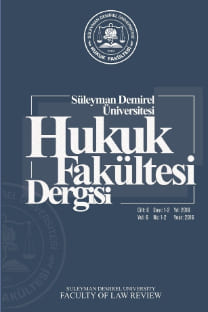TİCARET ŞİRKETLERİNDE KONU DIŞI İŞLEMLER VE SONUÇLARI
Yeni Türk Ticaret Kanunu (TTK), ticaret şirketlerinin konu ile sınırlı ehliyet anlayışını terk etmiştir. Bu değişiklik, ticaret şirketlerinin gerçek kişiler gibi sınırsız ehliyete sahip oldukları şeklinde yorumlanmamalıdır. Yeni kanun, konu dışı işlemleri yok hükmünde kabul eden önceki Türk Ticaret Kanunu (ETK) anlayışından vazgeçmiş, esas olarak bu tür işlemlerin ayakta tutulması ilkesini benimsemiştir. Bu doğrultuda ticaret şirketlerinin hak ehliyeti genişletilmiş, fiil ehliyeti ise şirketin işletme konusu ile sınırlandırılmıştır. Kanun koyucu, konu dışı işlemlerin geçerlilik şartlarını, üçüncü kişilerin güveninin korunması hedefine uygun şekilde anonim (ve limited) şirketlerle sınırlı olarak TTK m. 371/2 hükmünde düzenlemiştir. Ancak söz konusu hükmün uygulanabilirliği; ticaret sicilinin etkisi, tacir sıfatının sonuçları (basiretli iş adamı gibi hareket etme, ticaret unvanı kullanma yükümlülüğü) gibi temel esaslarla çatışması sebebiyle son derece sınırlıdır
Anahtar Kelimeler:
Ehliyet, tüzel kişi, ticaret şirketlerinin konusu, konu dışı işlem (ultra vires), hak ehliyeti, fiil ehliyeti, ticaret sicilinin etkisi, basiretli işadamı gibi hareket etme yükümlülüğü
THE ACTS WHICH ARE OUTSIDE THE OBJECTS OF THE COMMERCIAL PARTNERSHIP AND ITS CONCLUSIONS
The new Turkish Commercial Code (TTK) discontinued the idea of commercial partnership which is limited to the object matter. This change shouldn’t be construed as if the commercial partnership has unlimited legal capacity such as the real person. The abrogation Turkish Commercial Code (ETK) has ceased the acts which are outside the objects of the company is null and void. Yet the new law accepted acts done by the organs of the company shall be binding upon it even if those acts are not within the objects of the company. In this respect the capacity to acquire rights of the commercial partnership has been broaden and the capacity to acts of the companies have been limited within the frame of the objects clause of the companies. The legislator regulated the terms of validity of the acts which are outside the object matter accordingly the goal of protection of the third-party trust at TTK article 371/2, joint stock company (and partnership with limited liability). However, the enforceability of this provision is extremely restricted because of the confliction with the basic principles such as the effects of the commercial registers, the title of merchant results (to act as a prudent businessman, the obligatory usage of the trade name)
Keywords:
Legal capacity, legal person, the object of the commercial partnerships, ultra vires, capacity to acquire rights, capacity to acts, the effects of the commercial registers,
- ISSN: 2146-7129
- Yayın Aralığı: 2
- Başlangıç: 2011
- Yayıncı: SÜLEYMAN DEMİREL ÜNİVERSİTESİ HUKUK FAKÜLTESİ
